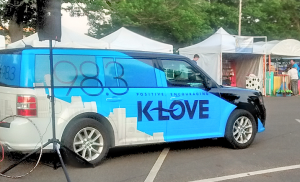Just before the Fall Pledge Drive, K-LOVE purchased three stations from Entercom for $58-million. According to the industry blog, Radioinsight,
EMF [Educational Media Foundation – K-LOVE’s parent company] will acquire Classic Rock “100.3 The Sound” KSWD Los Angeles as well as 92.1 KSOQ Escondido CA (Simulcasts Country http://www.froggy101.com/“>97.3 KSON San Diego) and 95.9 WGGI Berwick PA (Simulcasts Country “Froggy 101” WGGY Wilkes-Barre).
Entercom divested the stations as part of their merger with CBS.
This year K-LOVE has also acquired stations in other markets including Rhode Island, Louisiana, Virginia, and Ohio. These are just a few of the purchases. K-LOVE has been quite active this year. What is clear is that the pledge drives are making it possible for K-LOVE to increase market share not just stay on the air.
More expansion is likely to be in K-LOVE’s future. Radioinsight’s Lance Venta recently wrote:
Educational Media Foundation’s business model portends well to constant expansion. Multiple federal rules allow EMF to take advantage of loopholes that commercial operators do not have the opportunity to do so. As a non-profit EMF can take advantage of tax credits and loopholes. The networks take on the majority of their revenue through listener donations and as the group expands to more markets that brings more potential listeners and donors. With the main-studio waiver that each EMF license holds, the local stations do not exist as anything more than a rack of equipment at the translator site as programming currently all comes from a pair of locales. They don’t need to have a local studio or maintain local staffing cutting down costs.
Local Christian radio is just about gone. Many of these stations have been gobbled up by K-LOVE with no end in sight. The FCC just did away with the requirement that broadcasters must have a local presence near the location where they have a license to broadcast. K-LOVE has long obtained waivers from this rule in order to broadcast nationally without needing to have a local station. Now they don’t need to get waivers.
the requirement that broadcasters must have a local presence near the location where they have a license to broadcast. K-LOVE has long obtained waivers from this rule in order to broadcast nationally without needing to have a local station. Now they don’t need to get waivers.
The FCC move was opposed by smaller broadcasters who will now be at a disadvantage in their competition with larger corporations. Beyond competition, the concern is that news coverage could be slanted away from local interests.
Regarding K-LOVE and Christian music, K-LOVE already has an out-sized influence on trends in Christian music. Programmers control who has entrance into the market and who stays current. They control so much of the market that artists are at their mercy. Over the years, creativity has been hard to find within the evangelical bubble and I worry that the repetitive pop sounds coming from every market will stifle it even more.